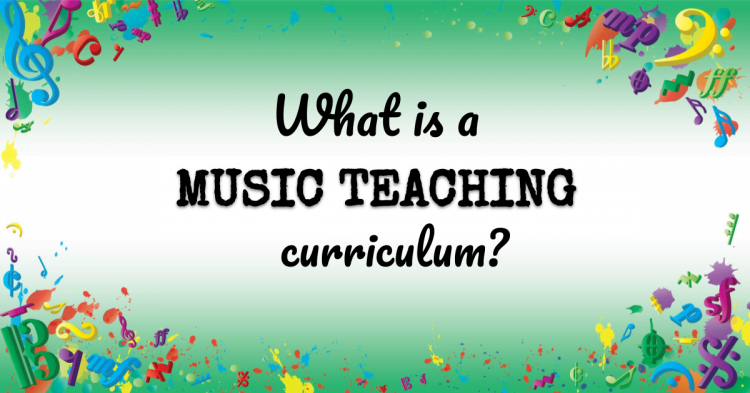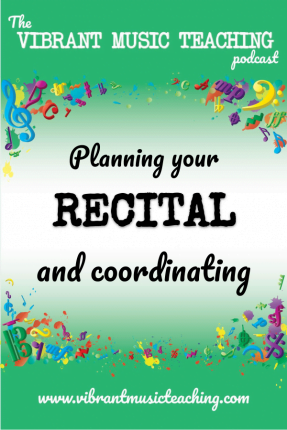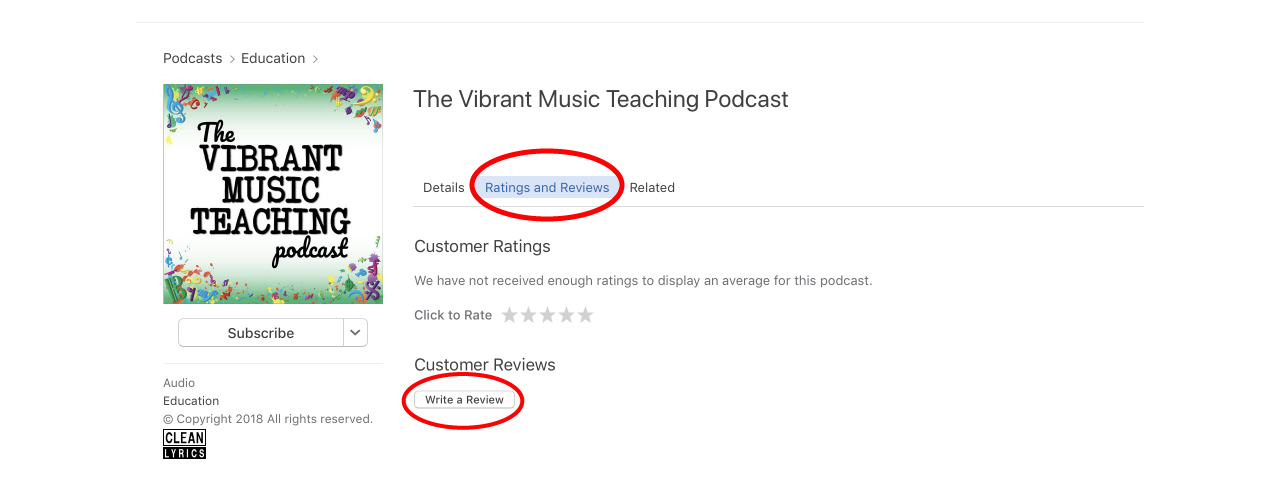What is a music teaching curriculum and why would you want one? I believe this is one of the most powerful things you can do in your studio and today I want to talk you through why it’s so important.

Relevant Resources
Full Transcript
Click on any word to jump to that point in the audio. 🙂
VMT 031 – What is a music teaching curriculum.mp3 (transcribed by Sonix)
Vibrant vibrant vibrant music teaching proven and practical tips strategies than ideas for music teachers.
This is episode 31 of the vibrant music teaching podcast. I’m Nicola Cantan and in this episode we’re talking about music teaching curricula
Welcome beautiful teachers. So today we’re talking about creating a curriculum for your music teaching practice why you might want to and what I even mean by the word curriculum because it’s a bit of a vague word perhaps that may be used for different things but I do think it’s the best one for what I want to describe here. So when we think about curriculum for a particular subject we’re not really thinking about it in terms of school. School teachers might have a curriculum that they have to teach in year one year two whatever during a student’s schooling. They have standards that they are expected to achieve and sometimes those are too rigid and we won’t get into that conversation. But there is something laid out that says this is what should be learned by this age by that age or by that level of schooling or by that term we don’t have that as music teachers and we often don’t really think in this way either do we. We don’t have governing bodies. There’s no one standing over us saying Your students must have learnt the C major scale before they reach their third year of study or before they reach age 8 or anything. Right. And I’m not saying that they should be there shouldn’t be anyone standing over saying those particular things.
But one of the reasons we don’t think in this way is that music is considered extracurricular. OK. So parents are not expecting it either are they. They’re not expecting us to have a laid out step by step process for how we teach or for what we’re teaching and what will be achieved by different levels. And yes that can be a good thing. It’s good to have some flexibility but it’s not good to just not know where you’re going. Do you see the difference. There’s no reason that this means we should just be winging it. We shouldn’t just be flying by the seat of our pants We can actually plan these things out and still be flexible. So that’s what I want to talk about today. Even though we don’t have someone standing over us saying you must teach this you must teach that we can stand over ourselves a little bit and put some conscious thought into how we set the curriculum in our studio and what we want to teach our students and when. Because if you don’t set this stuff if you don’t decide it consciously something else is deciding it for you.
You can’t just not have one. All you have is a bad curriculum or an unintentional one but maybe you’re letting it be set by exams. I know that’s true in a lot of countries and I’ll talk about that a bit more in a minute. Maybe the exam board is setting your curriculum maybe method books are maybe you run the whole way through a method book series and you follow that and that’s basically your curriculum. That’s what acting as your curriculum. Or maybe it’s your pure chance. Maybe you hop from one book to the other from one thing to another. You teach leadership when you feel like it you did scales when you feel like it and there’s no real rhyme or reason behind it. Now as I said there’s nothing wrong with being a bit flexible and we’re sometimes going with the spur of the moment going with what you want to teach at a particular time of year or for a particular event. That’s fine. Flexibility is fine. I don’t want someone standing up and saying this is how it should be let’s all decide exactly when we should teach what.
And stick to it forever and ever amen. No but there’s nothing wrong with having a pre thought out curriculum for your music teaching that you can refer back to to see it off track. Am I aligned with the goals I have for my studio or am I not. Am I teaching the student what I should be teaching or have I left any gaps. I started thinking about this word curriculum because of something that was really a brief though a throwaway comment at something I attended at the Royal Irish Academy of Music. So that’s our main sort of music academy here in Dublin and they run the most popular exams in Ireland. So we still have a bias and we have Trinity but rearm the Royal Academy would be a little bit more popular. OK. Anyway so they run trainings for teachers and I was at one of these events. I think it might have been one of their conferences that they run every year which are fantastic. Anyway so I was at one of these talks and there was some question time and a teacher asked how do I incorporate pieces in between exams and how do I motivate my students to learn them and parents to get on board with them as well. Right. So they were asking for suggestions of in between exams stuff and what they should be teaching and how they motivate their student to do that.
And the Examiner The one of the head examiners was there answering these questions and he said he explained a little bit and he gave her some suggestions and then he said we’ve said it before and I’ll say it again the exam syllabus is not a curriculum. And that really stuck with me because he so write the exam syllabus is not a curriculum exam board itself is saying it’s not a curriculum but that is a big part of what is wrong with the way we treat exams in this country in the UK and in Australia. And I think to a certain extent in New Zealand as well we’ve become so exam focused and we talk about these exam focused or the exam express to him Darwin calls it where students are so stuck on the exam express that everything else goes out the window and we forget that we’re supposed to be teaching them music and this really sums it up to me. The exam syllabus is not a curriculum. We can’t blame for the exams for that and I never have. I like for my students do exams sometimes but exams are supposed to be an assessment and they had a syllabus so that you know what to cover for that particular assessment so that your student is prepared for it.
It’s not meant to be a curriculum. They’re not saying this is everything you should teach. If they were you know that the selection of scales students learn each year would make no sense. Students should be learning all the scales and then they review and make sure the particular scales for a particular grade are up to scratch in the way that the examiner wants to see them. But that’s really where my scale was I’m getting a little bit off track here but kind of ties into the same thing I set up these scale levels a few years ago on the blog and they’ve been one of the most popular things there. And then of course in the in the VMT library if you want to check them out they’re members the scale levels were me trying to take back control of scales because I had let it go that my students pretty much only did the scales that they needed for an exam when they needed them. And yes I covered them a bit. I’d so that but I didn’t really have a plan for it. So the scale levels were a way to structure that to say no I want them to learn this full set for example Level one is all the major scales similar motion country motion and the arpeggios one octave for the whole circle of this before you know hopefully before they get to grade one certainly before they get to Grade Two level.
And my students might not be taking those exams but just as I as a guide. Anyway so that’s where the skill levels come from and things like that when you really step back and say I’m I just teaching to the exam what you’re asking is am I treating the exam syllabus as my curriculum that’s what teaching to the exam is you’re teaching that as if it’s the be all and end all that’s it. The syllabus is is your teaching plan but it’s not it shouldn’t be. I don’t think any exam board would tell you that it should. It’s not supposed to be everything you have to go up with your curriculum and exams can be a part of that and the syllabus will help guide you to when you’re preparing specifically for that exam. OK.
So exams are an assessment they’re not everything we teach and they’re not our curriculum we get to set our own on our own curriculum should be based on our goals what we want for our students what types of students we have what we want our studio to be and to represent. Is yours the creative studio. Is it the in depth theory studio is it the playing by ear studio is it the classical only studio is it the studio where all students learn the well tempered career it doesn’t matter what it is I’m not telling you what it should be and I will talk you through how you can find answers to these questions in next week’s episode but today I just want you to think about this idea of curriculum whether you have one or rather what your curriculum is now because even if you don’t think you have one as I said something is setting it it could be chance it could be exams it could be method books it could be anything but something is basically deciding your curriculum now and what is it. What’s your curriculum at the moment. A curriculum can be a great framework for moving forward it doesn’t have to be a prescription. So if you’re listening to this thinking No that’s too restrictive. I can’t set it that way. I like to be spontaneous I like to follow my students whims. I’m not saying you shouldn’t do that but I think we should all agree that no student should get to late intermediate repertoire and somehow not know what a crescendo is. So if that’s the case setting a curriculum will mean that you’re not leaving that kind of stuff to chance Yes chances are they’ll encounter a crescendo but there’s this tiny chance if you just do random stuff.
They’ll get to that level and they won’t know what a crescendo is. And yeah they can look it up but you see what I mean. We don’t want to leave these gaps. We want to want to be that teacher that as much as they try not to.
Teachers will complain about it when they get a transfer a student from them and I’m not talking about the one hour situation where a student just isn’t absorbing stuff. I’m talking about there being major gaps and inconsistencies in the way students are encountering these concepts and learning things and developing their skills so it doesn’t have to be prescriptive. But I believe it does have to exist because it does anyway. Next week we’ll talk about how you find your music teaching curriculum. So I hope you’ll join me for that. You can find the show notes for today’s episode at vibrant music teaching dot com slash 31. And if you’re interested in all this curriculum stuff I’ve got something really exciting to tell you about. I’m doing something called the curriculum kick off. This is going to be a five day challenge to improve your curriculum and lesson planning so that you can feel confident with what you’re doing. I get a lot of questions from teachers about how they can plan their lessons in a way that makes sense for music teachers that isn’t designed around classroom teaching which is completely different and that is flexible enough to work for them but helps them feel on top of things and like they’re getting through the maximum they can in the lesson time.
So that’s what we’re going to be doing in this curriculum kickoff. It’s gonna be really fun. It’s going to be a great challenge. The community come together. It is totally free so anyone can participate and we’re gonna help you set up your music teaching curriculum and lesson plan for success. It’s gonna be a really great great experience for you guys and I’m looking forward to it as well so you can sign up for that right now if you just go to the blog or this site vibrant music teaching music teaching dot.com or colorful keys dot com. That’s colorful word to use by the way and there you’ll see a little widget in the bottom right hand corner. That’s the easiest place to sign up and get involved in the challenge when it kicks off it’s kicking off in a few weeks. Last thing before I let you go is I want to let members know that know power booster 1 your music teaching curriculum if you want to use it as that is now available inside the library. This is a 40 week plan that will take you through oral work rhythm work theory and improvisation technique. All that kind of stuff. Everything but the pieces for 40 weeks that’s a whole year for most people. Or maybe a year and then some for some of you of including this stuff in your lessons. In a way that is structured thought out a logical progression and helps take some of the weight off your shoulders when it comes to lesson planning. So you can get that inside the video library you can get the full course or you can get the lesson plans as well in the printable library whichever suits you better that’s available right now for you. That’s it for this week.
We’ll talk about how you find your music teaching curriculum next week and I’ll see you then if you’re not a member and you like the sound of the piano power booster one the 40 week plan that will take you through oral work rhythm work technique and theory for a whole year of teaching. Then you have to check out the vibrant music teaching membership. This full course as well as many others and tons of games and principles and fun stuff is available inside. You can sign up today at VMT dot ninja.
Sonix is the best online audio transcription software in 2019.
The above audio transcript of “VMT 031 – What is a music teaching curriculum.mp3” was transcribed by the best audio transcription service called Sonix. If you have to convert audio to text in 2019, then you should try Sonix. Transcribing audio files is painful. Sonix makes it fast, easy, and affordable. I love using Sonix to transcribe my audio files.

Subscribe and Review the Vibrant Music Teaching Podcast
Subscribe to the podcast in Apple Podcasts or iTunes here so you don’t miss the next episode and you can take it with you as you run errands, clean the house or walk the dog.
If you’re enjoying the podcast please take a moment to leave a review and a rating.
- Click here to open the podcast page
- Click “view in iTunes” if it doesn’t automatically open there
- Click “Ratings and Reviews” and leave a review

What did you think of this episode?
Let me know in the Vibrant Music Studio Teachers group on Facebook. I’ll see you there. 🙂